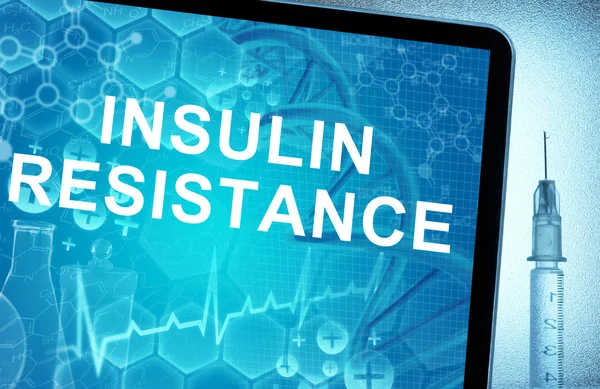Numerous Genetic Markers Tied to Insulin Resistance Uncovered – A pioneering study has uncovered numerous genetic markers tied to insulin resistance. This complicated metabolic condition involves a reduced responsiveness of cells to insulin, which leads to abnormal lipid levels and elevated levels of insulin and glucose in the bloodstream.
Extensive genome-wide association studies have been crucial in uncovering common genetic variations linked to insulin resistance. More recently, exome sequencing has played a key role in discovering rare variations contributing to its development.

The study used triglyceride (TG):high-density lipoprotein-cholesterol (HDL-C) ratio as a highly accurate indicator of insulin resistance.
The study analyzed data from over 400,000 people from the UK Biobank, greatly broadening the scale of prior research. The researchers utilized state-of-the-art techniques to pinpoint and confirm genetic markers related to insulin resistance.
These genetic markers, including single nucleotide polymorphisms (SNPs), act as potential identifiers of insulin resistance and may further enhance the optimization of treatment for related conditions such as type 2 diabetes mellitus and coronary artery disease.
The INSR gene has been identified as a key genetic factor in type A insulin resistance syndrome, a related inherited severe insulin resistance syndrome
Key findings
- Genome-wide association study (GWAS): Researchers analyzed triglyceride (TG):high-density lipoprotein-cholesterol (HDL-C) ratios in over 400,000 individuals to identify genetic variations linked to insulin resistance.
- 369 genetic loci: The study identified 369 independent single-nucleotide polymorphisms (SNPs) associated with insulin resistance, with 318 being previously unreported.
- Loci linked to metabolism: These SNPs are clustered in genes involved in insulin signaling, protein metabolism, and the function of fat cells (adipocytes), providing insights into the mechanisms of insulin resistance.
- Polygenic risk scores: Combining these high-confidence loci, researchers developed scores that predict the risk of various metabolic diseases, including hyperglycemia, diabetes, and hypertension.
- Sex-specific effects: Notably, 31 loci showed differences in their effects between men and women, highlighting the role of sex hormones in metabolic health.
- The study also confirmed previous findings on 114 known insulin resistance-associated variants.
- Certain variants showed sex-specific effects, suggesting potential differences in metabolic risk between men and women.
- The researchers identified liver-related genes and mutations associated with fat retention and increased insulin resistance.
What are the symptoms of insulin resistance?
Insulin resistance usually does not cause any symptoms, and it is often detected during routine blood work or annual health exams.
Some signs of insulin resistance that your doctor may look for include a waistline over 40 inches in men and 35 inches in women, skin tags or patches of dark velvety skin called acanthosis nigricans, a blood pressure reading of 130 over 80 or higher, a fasting glucose level equal or above 100 milligrams per deciliter, or a blood sugar level equal or above 140 milligrams per deciliter two hours after a glucose load.
Other conditions that are associated with insulin resistance include obstructive sleep apnea, fatty liver disease, polycystic ovarian syndrome (PCOS), Cushing’s syndrome, and lipodystrophy syndromes.
However, these conditions may not always be present in individuals with insulin resistance.
Study source
Frequently Asked Questions (FAQs)
What are Genetic Markers?
Genetic markers are specific sequences of DNA or RNA that can be used to identify individuals or species. They can also indicate the presence of a specific gene or genetic variations associated with certain health conditions or traits.
What is Insulin Resistance?
Insulin resistance is a condition where the body’s cells become less responsive to the hormone insulin, which regulates blood sugar levels. This can lead to higher blood sugar levels and eventually type 2 diabetes and other health issues.
How are Genetic Markers Linked to Insulin Resistance?
- Research has identified hundreds of genetic markers that are associated with an increased risk of developing insulin resistance.
- These markers can influence how the body produces, uses, and responds to insulin.
- Identifying these markers can help predict an individual’s risk of developing insulin resistance and related conditions.
Can Insulin Resistance be Prevented or Treated?
- Prevention and Lifestyle: Maintaining a healthy diet, regular exercise, and a healthy weight can help reduce the risk of developing insulin resistance.
- Treatment Options: For those who are insulin resistant, medications alongside lifestyle changes can help manage the condition and prevent complications.
- Genetic Testing: Genetic testing can identify individuals at higher risk, allowing for early intervention and personalized treatment plans.
How Significant is the Link Between Genetics and Insulin Resistance?
The link between genetics and insulin resistance is significant, but it’s important to note that lifestyle factors also play a crucial role. Genetics may predispose individuals to insulin resistance, but lifestyle choices can influence the extent to which this predisposition affects an individual’s health.
Can Changes in Lifestyle Overcome Genetic Predisposition to Insulin Resistance?
- Yes, in many cases, adopting healthy lifestyle changes can significantly reduce the risk of developing insulin resistance, even for those with a genetic predisposition.
- Lifestyle changes that can make a difference include eating a balanced diet, regularly engaging in physical activity, and maintaining a healthy weight.
- However, the effectiveness of these changes can vary from person to person, depending on numerous factors including the number and type of genetic markers present.
Where Can I Find More Information?
For more information about insulin resistance, genetic markers, and how they are connected, consider consulting healthcare professionals who specialize in endocrinology or genetics. Additionally, reputable health organizations and research publications are excellent resources for up-to-date information.






